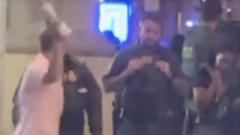What Happened When a Sandwich Was Thrown at a Federal Agent in DC?

Understanding the Incident Involving DOJ Employee Sean Charles Dunn
In an unusual turn of events, an employee from the United States Department of Justice (DOJ) has been arrested for allegedly throwing a Subway sandwich at a federal agent. The incident has sparked widespread discussion, highlighting the tensions surrounding recent federal deployments in Washington, D.C. under President Donald Trump's administration. Sean Charles Dunn, previously employed in the DOJ's Criminal Division, faces felony assault charges following this bizarre episode. This situation not only raises questions about public safety and law enforcement practices but also sheds light on the political climate in the capital.
The Incident: What Happened?
On a Sunday afternoon, Sean Charles Dunn reportedly threw what witnesses described as a "submarine-style sandwich" at a Customs and Border Protection (CBP) officer. The incident was captured on video, where Dunn can be heard shouting phrases like "fascists" and expressing his disdain for the federal agents present. His emotional outburst culminated in the sandwich being hurled at the agent, who was in full uniform, apparently equipped with a bulletproof vest. After the act, Dunn fled the scene but was later apprehended by law enforcement.
Charges and Consequences
Following the video evidence, Dunn was charged with felony assault. U.S. Attorney General Pam Bondi made it clear that Dunn's actions were unacceptable, stating, "Not only is he FIRED, he has been charged with a felony." The bizarre nature of the incident led to numerous jokes circulating online, including quips about "assault with a deli weapon." While some may find humor in the situation, the legal ramifications for Dunn are serious; he faces a potential prison sentence of up to eight years if convicted.
The Political Context
The backdrop of this incident is marked by heightened tensions in Washington, D.C. Following a crackdown on crime promised by President Trump, federal law enforcement agencies alongside the National Guard were deployed to the city. This move has been controversial, particularly in a predominantly Democratic area that has seen significant decreases in violent crime—reportedly at a 30-year low. The presence of federal agents has incited protests and anger among local residents, further complicating the dynamics of law enforcement in the capital.
The Reaction from Authorities
Local officials and law enforcement have responded firmly to the incident involving Dunn. U.S. Attorney for Washington, D.C., Jeanine Pirro, emphasized the seriousness of the charges against Dunn, suggesting that what he thought was a joke would have severe consequences. In her announcement, she stated, "He thought it was funny. Well, he doesn’t think it’s funny today." Her remarks highlight the gravity with which federal authorities are approaching acts of aggression against law enforcement, regardless of their nature.
Understanding the Federal Presence in D.C.
The deployment of federal agents in Washington, D.C., has raised questions about local governance and civil rights. The District of Columbia, unlike U.S. states, does not have the same level of autonomy or representation in Congress. This has led to a complex relationship between local authorities and federal oversight. The federal control over the city’s police department, as authorized by the District of Columbia Home Rule Act, has further complicated the political landscape, leading to feelings of disenfranchisement among residents.
Implications for Local Law Enforcement
The ongoing presence of federal law enforcement has implications that extend beyond individual incidents. With about 100 arrests occurring since the deployment began, there is a clear indication of escalating tensions. The use of federal resources, such as the FBI, U.S. Marshals Service, and other agencies, raises questions about the effectiveness and appropriateness of federal intervention in a city that has its own law enforcement capabilities. The local police force is now functioning under direct federal oversight, which could alter the dynamics of policing in the area permanently.
Public Sentiment and Protests
Public reaction to the federal presence in Washington has been mixed. Many residents express anger and frustration over the perceived militarization of their city. Protests have erupted, with demonstrators voicing their concerns about civil liberties and the appropriateness of federal oversight. The local government's limited ability to manage the situation underscores the unique challenges faced by D.C. residents, who navigate a complicated landscape of representation and rights.
The Broader Impact on Crime Policy
The backdrop of Dunn's actions and the subsequent federal response invites a broader discussion about crime policy in urban settings. While crime rates in Washington, D.C. have decreased significantly, the federal government's approach to law enforcement reflects a zero-tolerance attitude toward any perceived threat to public safety. This could lead to more aggressive policing tactics, which may not align with the priorities or sentiments of local residents. The juxtaposition of federal intentions against local realities raises essential questions about the effectiveness and ethics of such strategies.
Conclusion: Reflecting on the State of Law Enforcement
The incident involving Sean Charles Dunn serves as a focal point for discussions on law enforcement, political tensions, and civil rights in Washington, D.C. As federal agents navigate the complexities of policing in a city with a distinctive political landscape, it is crucial for both local residents and policymakers to engage in conversations about representation, governance, and community safety. The fallout from this incident may influence how law enforcement operates in urban areas, potentially reshaping the relationship between residents and the forces tasked with their protection.
FAQs
What are the charges against Sean Charles Dunn?
Sean Charles Dunn has been charged with felony assault for allegedly throwing a sandwich at a federal agent.
Why has there been a federal presence in Washington, D.C.?
The federal presence is part of President Trump's crackdown on crime, which has involved deploying federal agents and the National Guard to the city.
How has the local community reacted to the federal deployment?
The local community has expressed anger and frustration, leading to protests and discussions about civil rights and local governance.
What are the implications of federal oversight on local law enforcement?
The implications include potential changes in policing tactics and a shift in community relations with law enforcement, raising questions about representation and civil liberties.
As the situation unfolds, how do you think the relationship between local residents and federal law enforcement will evolve? What steps would you recommend to ensure a balanced approach to crime and community safety? #LawEnforcement #CivilRights #CriminalJustice
Published: 2025-08-14 22:21:04 | Category: wales



